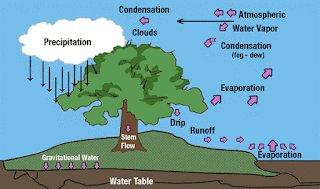2.1 What is the interception?
2.2 Components of interception
(1)Interception loss (I)
Water retained in the surface and
evaporates or absorb by the plants later.
(2) Throughfall(TF)
Water
falls through spaces in the vegetation canopy or falls along the twigs and
leaves.
(3) Streamflow (SF)
Water
flows along with the leaves and twigs. Finally, all of the water flows are collected
together and fall along the trunk to the surface.
Interception loss
I=P-(TF-SF)
2.3Factors
affecting interception
(1) Storm (Nature and distribution
of the storm.)
Drizzle-Before reaching to the ground,
most of the water droplets are evaporated. When intensity and duration of
precipitation are relatively high, lower interception is taken place.
(2)A plant (Canopy size, canopy
density and leaf characteristics)
When canopy size is wide, more water droplets are intercepted,
they took relatively more time to reach the ground so most of the water droplets are evaporated
back to the atmosphere. When canopy density is high, amount of leaves and twigs in
unit surface area is relatively high so more water droplets are intercepted and
take relatively more time to reach the ground, therefore, most of the water droplets are
evaporated during the process. When leaves are rough, they consist of less
amount of wax, therefore, water droplets are relatively more tended to remain on
the surface so most of the water droplets are intercepted and evaporated back to
atmosphere. When leaves are smooth that means these leaves consists of
relatively more wax so water droplets are relatively less tented to remain on
the surface of the leaves, therefore, interception is limited and evaporation
back to the atmosphere is relatively less.
(3) Season of the year (Vegetative growth and canopy
characters)
Rainfall is relatively more intercepted than snowfall. Some
of the trees are removed them all leaves in specific duration in each year and
grow new leaves after duration. Therefore interception is relatively most limited
during that time period and most of the water droplets are reached to ground. Less
evaporation has occurred.
(4) Prevailing wind
Interception of leaves and twigs are reduced by prevailing
wind but the evaporation rate is relatively high.




Post a Comment